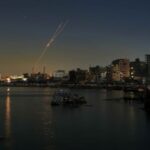
Ahh the California beach. Roaring surf. Golden sunsets. And the sweet smell of Mexican sewage.
That’s the reality taking place along south Imperial Beach, according to a study from the Scripps Institute of Oceanography at the University of California at San Diego.
Raw sewage that meanders its way along the Tijuana River in Mexico flows into the Pacific Ocean and has for years. There’s a lot of it.
According to the website InterestingEngineering,13 billion gallons of sewage-polluted waters have flowed out of the river into the Pacific Ocean since December.
“This input of contaminated water has caused chronic coastal water pollution in Imperial Beach for decades. New research shows that sewage-polluted coastal waters transfer to the atmosphere in sea spray aerosol formed by breaking waves and bursting bubbles,” Scripps said in a release.
“Sea spray aerosol contains bacteria, viruses, and chemical compounds from the seawater,” the Scripps release continued.
“This research demonstrates that coastal communities are exposed to coastal water pollution even without entering polluted waters,” study lead author Matthew Pendergraft said.
“More research is necessary to determine the level of risk posed to the public by aerosolized coastal water pollution. These findings provide further justification for prioritizing cleaning up coastal waters,” he said.
The research shows pollution’s impact is wider than anyone thought, according to one researcher.
Would you live in modern California?
Yes: 0% (0 Votes)
No: 100% (1 Votes)
“We’ve shown that up to three-quarters of the bacteria that you breathe in at Imperial Beach are coming from aerosolization of raw sewage in the surf zone,” lead researcher Kim Prather said.
“Coastal water pollution has been traditionally considered just a waterborne problem. People worry about swimming and surfing in it but not about breathing it in, even though the aerosols can travel long distances and expose many more people than those just at the beach or in the water,” Prather said.
Having determined that ocean spray contains bacteria and chemicals that came from the Tijuana River, the next step for the research is to determine what pathogens are a danger to anyone breathing the ocean air.
“The bottom line is we don’t know what sort of the effect is yet of inhaling this sort of cocktail that comes out of the ocean. We want to understand. We are doing further work. We’re really ramping up to understand the conditions that lead to this aerosolization,” Prather said, according to KNSD.
“This is not just a problem in Imperial Beach, it goes all up and down the West Coast,” Prather said.
Prather said researchers will swab lifeguards, surfers and others to determine how much respiratory exposure they have suffered, according to the Los Angeles Times.
“The bottom line is we don’t know what the effect is yet of inhaling this cocktail that comes out of the ocean,. This is tip of the iceberg,” she said.
Robert Knight, a professor of pediatrics, computer science and engineering at UC San Diego said, “It was a complete shock to find how much of microbes in the air were traceable back to sewage. We had no idea that effect would be so strong.”
“Now that we know this is a real phenomenon, we need to find out what are the impacts to human health,” he said.






